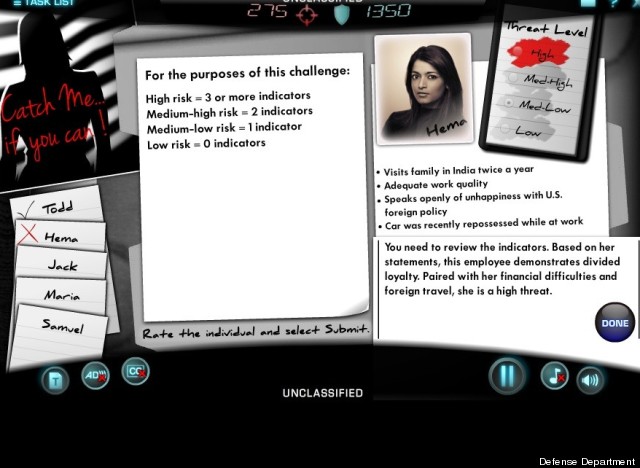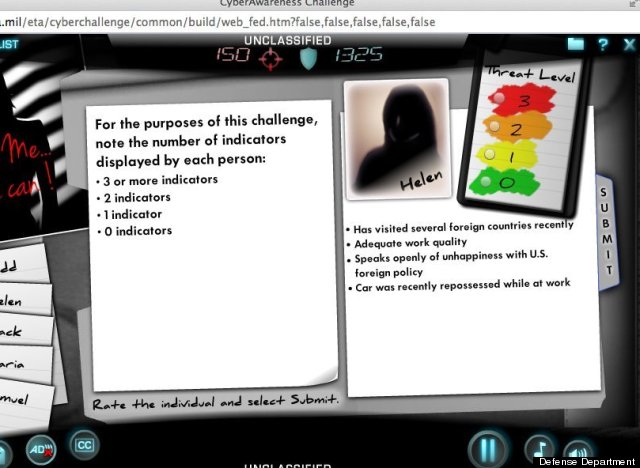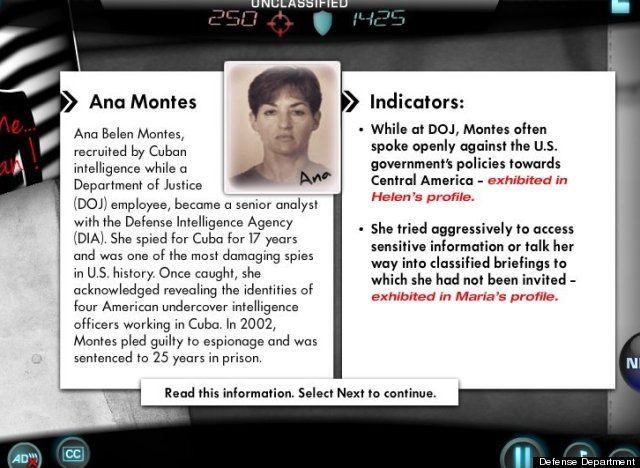
A new version of a computer-based cyber-security training course from the Pentagon still classifies disillusionment with U.S. foreign policy as a "threat indicator" that a federal employee might be a spy.
That training, available online and still being used as recently as last week, has been administered to millions of military and civilian employees throughout the federal government. Little seems to have changed since HuffPost reported on an earlier version of the same training course last year -- even though a spokesman said then that the training was being "updated."
Back then it was "Hema" who was unhappy with foreign policy -- now it's the anglicized "Helen." Back then she visited family in India -- now she just travels abroad. Either way, government employees are still dinged with a loss of points in a spy-catching game if they don't identify dissent and foreign travel as her threat "indicators."
Helen "speaks openly of unhappiness with U.S. foreign policy." Combined with her trips abroad and her money troubles, these clues get her labeled as a "high" threat.


The "CyberAwareness Challenge" training echoes many of the concepts in a 2012 "insider threat" policy produced by President Barack Obama's administration that treats people who leak to the press as security threats. The concern over insider threats has only intensified since the leaks from former NSA contractor Edward Snowden began.
Critics charge that in the process of identifying "insider threats," the government risks trampling on the First Amendment.
One concerned federal employee, who took the training in an agency far removed from the Pentagon, told HuffPost that its goal seems to be "to encourage workers to identify individuals with critical opinions about our government and overtly consider them suspect."
"There is a message of intimidation here. If you express a concern about the government's functioning, you are a suspect," said the federal worker, who requested anonymity for fear of reprisal from his agency.
This year, the training also includes a slide telling government employees about Ana Montes, a woman who spied for the Cuban government while employed by the Defense Intelligence Agency in the 1980s, 1990s and 2000s.

Referring back to "Helen," the slide on Montes states that while she was employed at a previous federal agency in the 1970s and early 1980s, Montes "spoke openly against the U.S. government's policies towards Central America."
But the similarities to "Helen" might break down there. Once Montes got to the DIA, according to a book written by the counterintelligence agent who caught her, she avoided "idle chatter and personal interactions." DIA investigator Scott W. Carmichael noted in his book that Montes' political views were only of limited use in his investigation.
"Many people in government and academia also believed that the government's policy toward Cuba was mistaken. Some members of Congress thought so, too," he wrote.
Last year a Pentagon spokesman told HuffPost that the training was being "updated" with the recognition that "behavior" was superior to "personal characteristics or beliefs" as a sign of a potential security threat. This year, a Pentagon spokesperson did not respond to a request for comment on the training.
The cosmetic changes in the training course don't impress Steven Aftergood, a government secrecy expert at the Federation of American Scientists.
Aftergood told HuffPost in an email that "like the previous ones, the new training slides are obtuse, and may even be counterproductive."
"But it’s worse than that," Aftergood added. "This training is also bad security policy, since the most dangerous and effective counterintelligence or terrorist threats are unlikely to telegraph their views openly. Those who are on the lookout for outspoken critics of U.S. foreign policy based on this training are likely to miss them entirely."
